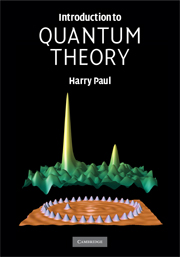1 - Unexpected findings
Published online by Cambridge University Press: 04 June 2010
Summary
Prelude: a new constant enters the stage
One year before his epoch-making work on blackbody radiation in which he postulated the existence of an elementary quantum of action, Max Planck (1899) proposed a system of natural units that was based on four universal constants. They were the velocity of light c, the gravitational constant f, and two new constants a, b that he took from Wien's radiation law (which he, at the time, believed to be strictly valid). He determined the numerical values of a and b from measurements of both the total energy emitted from a blackbody source and the constant in the exponent of Wien's law. In retrospect, since we know that Wien's law is a good approximation to the true radiation law (found by Planck in 1900), it becomes clear that b is nothing but the famous elementary quantum of action known as Planck's constant h, while a is identical to the ratio of h and Boltzmann's constant k.
Requiring all four constants to take the numerical value unity, Planck arrived at a system of physical units which he was quite enthusiastic about. He wrote (Planck, 1899): ‘It might not be without interest to remark that with the aid of the two … constants a and b the possibility is given to establish units for length, mass, time and temperature, which, independently of special bodies or substances, necessarily retain their importance for all times and for all, even extraterrestric and extrahuman cultures and which therefore can be termed ‘natural measurement units’. However, at the time little (if any) attention was given to his proposal.
- Type
- Chapter
- Information
- Introduction to Quantum Theory , pp. 1 - 12Publisher: Cambridge University PressPrint publication year: 2008



